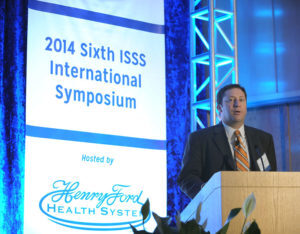I am writing from Detroit and Henry Ford Hospital, the site of the 2014 International Surgical Sleep Society meeting. The meeting brings together leaders from around the world, discussing the latest topics related to surgical and many non-surgical treatments other than positive airway pressure therapy (such as CPAP) and oral appliances. This was the 6th meeting, and the program incorporated outstanding talks as well as lively discussions among those dedicated to sleep surgery. The sessions focused on adult and pediatric sleep apnea, from preoperative evaluation to management to the procedures themselves as well as new therapies. It is hard to single out specific talks, as I enjoyed and learned from all of the speakers.
Instead, I want to highlight is the meeting devoted to research that occurred immediately prior to the conference. Like all fields of medicine, the more we have learned in sleep surgery, the more we find out that we do not yet know. We convened a number of us who are actively engaged in sleep surgery research and developed a plan to move forward with high-quality studies. This was not meant to exclude others, as any surgeon will be able to be involved in the projects. As with all surgical fields, most studies are very small in size (under 100 patients) and tend to come from single surgeons or single hospitals, and this small size limits the kinds of studies that can be done. To address this limitation, we decided to assemble a database of at least 500 patients undergoing a wide variety of surgical treatments. Such a database allows us to perform more-detailed studies, sorting out specific factors that are associated with outcomes of surgery. It is not perfect but has a number of advantages. The downside is that it does require some work to collect the data. I have pledged to support the database, but each surgeon has to assemble their own patients to add to the database. To reward that effort, anyone that contributes to this group of patients (what is called a retrospective cohort) will be able to perform studies using the data. This is exactly what was done by a group of Spanish sleep medicine physicians who mainly looked at CPAP results, and it truly improved our understanding of the risks of OSA as well as the benefits of treatment.
Any surgeons who would like to contribute to this database and perform studies using it should contact me at [email protected].





− 4 = 1